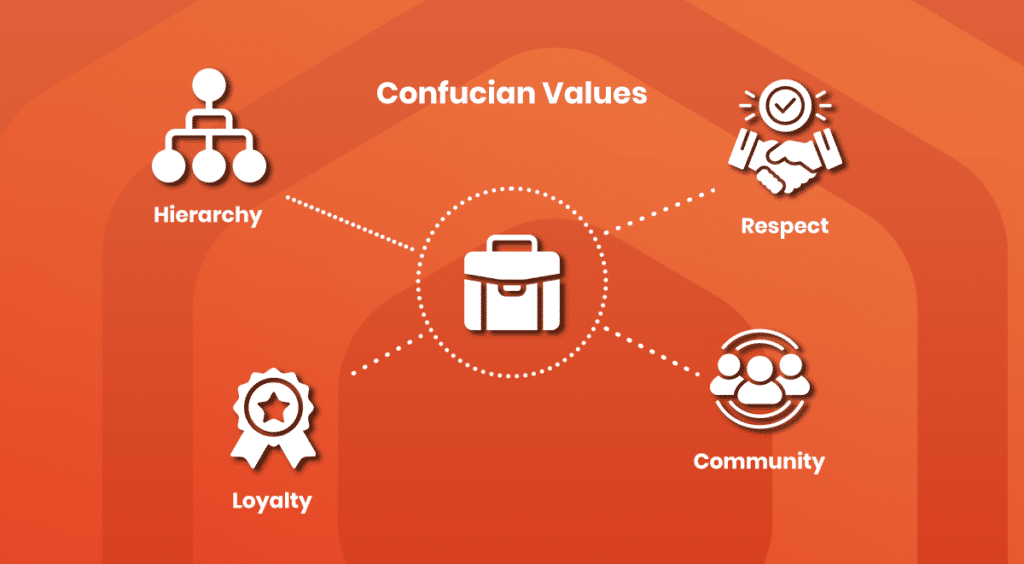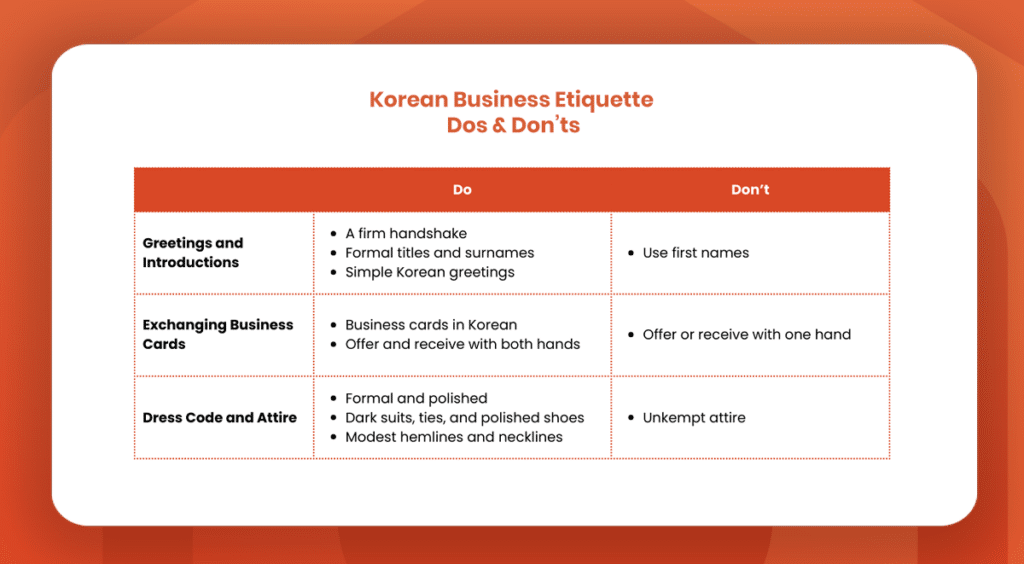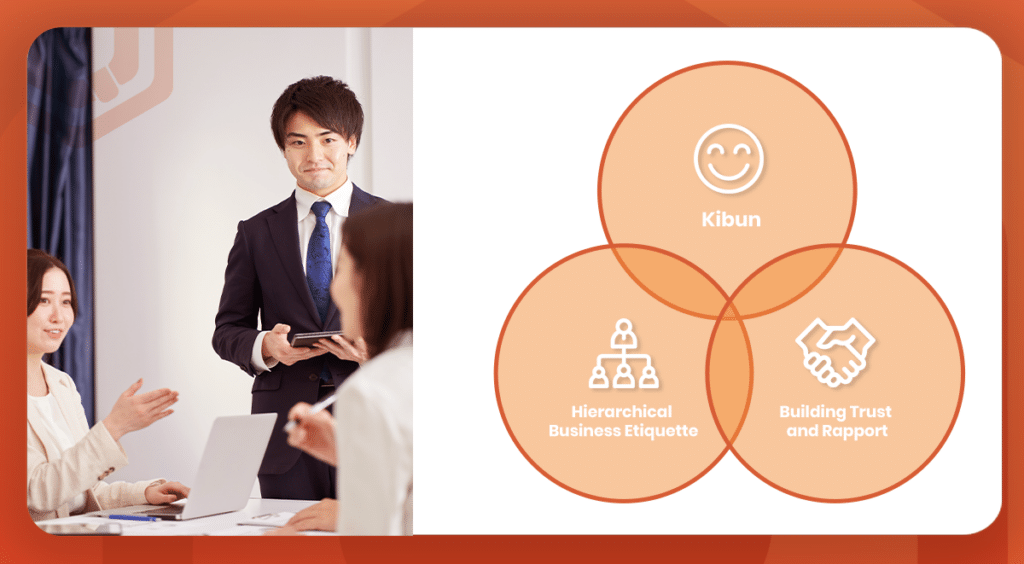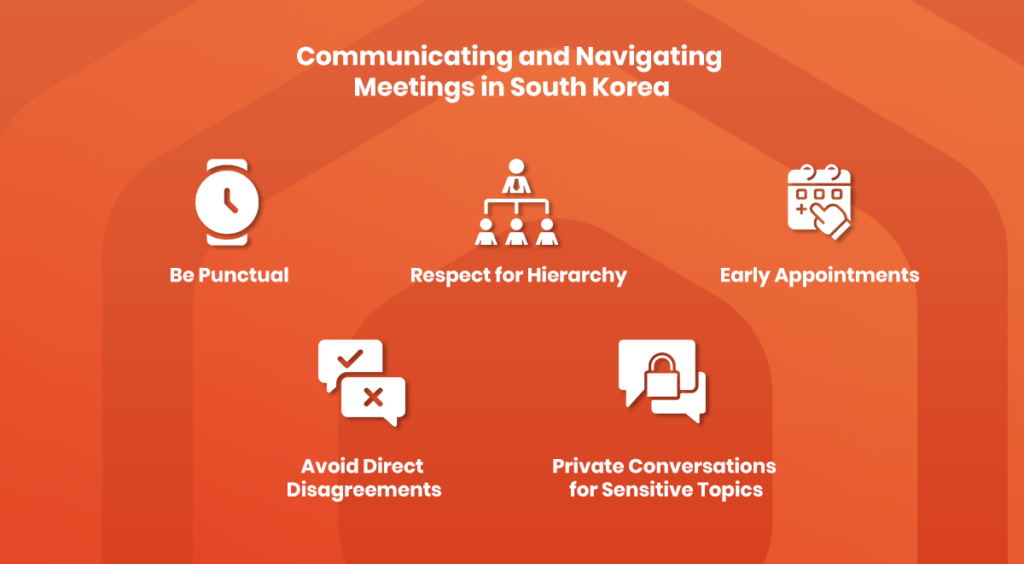Inquivix HQ
1-903, 18 Eonju-ro 146-gil,
Gangnam-gu, Seoul, Korea
06057

Are you venturing into South Korea with your business? How will the South Korean business culture affect your new business partnerships? There are many things you need to consider when you enter a new market with different cultural values and practices. Understanding the cultural nuances of this vibrant nation can lay a strong foundation for your business. In this blog, we examine the essence of Korean business practices, influenced by age-old traditions, Korean business etiquette, and much more. So, buckle up and prepare for a cultural deep dive that could provide you with the keys to successfully navigating the dynamic landscape of South Korean business culture.
Table of Contents
Understanding South Korean Business Culture
Deeper than Seoul’s high-tech buzz lies the heartbeat of South Korea—its richly woven business culture. When looking at a beautiful piece of Hanbok or the meticulously designed Gangnam district, you’ll realize the importance that South Koreans place on harmony and structure. These traits also extend into their business culture. Understanding Korean business culture is a cornerstone to achieving success in any entrepreneurial venture in this East Asian economic leader.
Confucian Values and Their Impact

South Korean society, much like the intricate details of a traditional Hanbok, is finely intertwined with Confucian values. This philosophical system shapes both social interactions and business practices in South Korea. A firm understanding of these Confucian principles can pave the way for smoother business relations and effective communication.
Confucianism, with its emphasis on hierarchy, respect, and loyalty, forms the foundation of Korean business culture. Hierarchical relationships define the Korean workplace, where age and position determine one’s rank. Decisions are often top-down, and respect for superiors is paramount.
Confucianism also promotes a sense of community, affecting how Koreans communicate in a business context. Direct confrontation or disagreement is avoided to maintain harmony and face, further emphasizing the importance of mastering Korean business etiquette before stepping into a first meeting.
Understanding the profound impact of Confucian values on Korean business culture will bring you one step closer to securing successful professional relationships in South Korea.
South Korean Business Etiquette Essentials
Just as a well-conducted orchestra produces a harmonious symphony, understanding and executing South Korean business etiquette can set the right tone for successful partnerships in the Land of the Morning Calm. From respectful greetings to dressing appropriately, diligently observing these etiquette essentials will demonstrate your cultural empathy and business acumen.

Greetings and Introductions
Your first encounter lays the foundation of a business relationship. In South Korea, greetings are a blend of culture and respect. A firm handshake coupled with a slight bow is the perfect balance of international and Korean business etiquette.
When addressing your South Korean counterparts, use formal titles and surnames. It’s a sign of respect and shows that you understand the importance of hierarchy. Stick to this formality until you’re invited to use first names.
Small efforts, such as learning basic Korean phrases and words, can also make a big impact. Saying “Annyeonghaseyo” (Hello) or “Gamsahabnida” (Thank you) could be your first step towards winning the hearts of your Korean partners.
Exchanging Business Cards
Exchanging business cards in South Korea is not a mere swapping of contact information but an intricate ritual. Korean-translated business cards signal your consideration toward your hosts. When offered, present and receive business cards with both hands, reflecting the importance of the exchange. Small acts such as these could go a long way in forming a favorable business relationship.
Dress Code and Attire
In the South Korean business world, the dress code carries the melody of formality and conservatism. Men typically wear dark suits, ties, and polished shoes, while women adhere to a similarly formal dress code with modest hemlines and necklines. Because first impressions matter, it’s crucial to align your attire with Korean business norms.
Building Business Relationships in South Korea
A serene river cannot be hurried, and similarly, building business relationships in South Korea takes patience, consideration, and understanding. Cultivating long-lasting professional relationships in South Korea involves more than just formalities—it is about earning trust, understanding cultural nuances, and respecting hierarchy

The Concept of Face (Kibun) and Its Significance
Translating seamlessly into the Western concept of “face” or dignity, ‘Kibun’ is a fundamental aspect of South Korean interpersonal relationships. In business and personal relationships, Kibun underscores the importance of maintaining dignity and harmony.
South Koreans typically avoid direct confrontations and negative responses to prevent damaging anyone’s Kibun. Therefore, understanding this concept and responding appropriately can be a deciding factor in your success in South Korea’s business world.
Hierarchical Business Etiquette
In South Korean business culture, hierarchy plays a central role. Paying due respect to superiors is not just a matter of courtesy but a vital part of Korean business etiquette. Furthermore, sociable activities involving drinking alcohol are a common form of bonding and showing respect to seniors. These informal settings provide a platform for building stronger relationships outside the rigid frameworks of the office.
Building Trust and Rapport through Business Relationships
Trust and rapport are not built overnight in South Korean business culture. It’s a steady process involving reciprocal gift-giving, dinner invitations, and genuine humility. The culture encourages modesty and humility, and gestures of these values can be instrumental in securing trust and respect in business relationships.
Communication and Meetings
In the dynamic South Korean business culture, communication and meetings hold a central role. Mastering the rhythm of conducting meetings and navigating communication nuances can lead your business partnership onto the stage of success in South Korea.

Navigating Meetings in South Korea
The roadmap to successful business meetings in South Korea is marked by punctuality, hierarchy, and respect for authority. Arriving late is considered disrespectful and can leave a negative impression. Business meetings in South Korea often begin with introductory remarks from the most senior person present. This embodiment of the culture’s respect for hierarchy can set the progress and tone of the meeting. Appointments are a must and should be scheduled in advance, even weeks beforehand. This practice provides ample time for preparation and is a token of respect towards your hosts.
The Business Etiquette of Language and Body Language
Reading between the lines is an essential part of decoding communication in Korean business culture. A direct “no” is rare. Instead, they may imply disagreement or skillfully steer the conversation to avoid confrontation. Expressing opinions or criticism requires a delicate touch to avoid damaging Kibun and potentially jeopardizing the business relationship. If you need to address sensitive topics, it’s often best to have a private conversation to preserve face and maintain harmony.
Business Dining and Socializing
An evening of Soju and Samgyupsal can play a significant role in the melodrama of South Korean business culture. Business dining and socializing present exceptional opportunities to weave stronger bonds and understand your partners beyond the confines of meeting rooms.

Business Dining Etiquette in South Korea
In the South Korean business landscape, building business relationships can extend to the personal life. The warmth of a shared meal can move professional relationships onto a personal level. Observing proper dining protocols can boost your status as a considerate and informed partner. When dining, like in many Asian cultures, wait for the most senior person to start before digging into your food. It is wise to learn to eat with chopsticks and remember never to leave them standing upright in your rice.
Drinking Culture in South Korean Business
Drinking has a special place in the South Korean business culture. It’s an intimate form of bonding, particularly among men, and often an inevitable part of business outings. To avoid running the Soju River dry, try not to let your glass remain empty for too long. Pouring others’ drinks is considered polite, but when it comes to your drink, wait for someone else to do the honor. Pro tip: If you’d like more to drink, subtly hint by refilling your neighbor’s glass, regardless of how full it already is.
Gift Giving and Other Business Practices
Understanding the nuances of local traditions and practices can play a pivotal role in the success of your business ventures. In Korean Business Culture, certain methods can shape your relationships and pave the way for smoother interaction with your business partners.

Gift Giving and Being a Guest
In South Korea, gift-giving is more than just an exchange of items. It’s an instrumental practice signifying respect, gratitude, and the strengthening of relationships. But don’t confound it with extravagance. The value of a gift isn’t determined by its price tag. The sentiment behind it takes precedence. Gifts should not be too expensive to avoid giving the impression of bribery. Moreover, they should be wrapped meticulously and always presented and received with both hands, as it’s a sign of respect and humility.
Understanding Business Contracts and Negotiations in South Korea
Navigating the lane of business contracts and negotiations in Korea can be akin to maneuvering through unfamiliar terrain. Koreans generally prefer flexible contracts that allow room for adjustments rather than stringent, unyielding terms. Here, a contract serves as an outline of the working relationship, a preliminary agreement that lays the groundwork for collaboration rather than a rigid, binding pact.
Clear communication is key; it’s essential to articulate your anticipations and apprehensions with your Korean business partner to avoid any potential misunderstandings. It’s best to employ qualified translators to avoid miscommunications. Ensure that both parties comprehend every aspect of the business relationship to establish a harmonious working relationship built on mutual understanding and respect.
Finding Success in South Korean Business Culture
Achieving success in the South Korean business environment goes beyond mastering the craft of negotiations and understanding contracts. It requires an intrinsic comprehension of the psychological, societal, and cultural nuances that deeply influence business practices.

Nunchi: Korean Emotional Intelligence
Nunchi, a term unique to Korean culture, is South Korea’s equivalent to Japan’s ‘Kuuki wo Yomu,’ or what we might call ‘reading the air.’ This concept is about fine-tuning your senses to perceive the emotional atmosphere of the room, understanding others’ feelings and thoughts, and adjusting your actions and responses accordingly. It’s more than just a social skill; it’s an art of empathy and a cornerstone of communication. Mastering Nunchi can aid in comprehending the subtleties of Korean business interactions, adding another layer of depth to your understanding of Korean business culture.
The Significance of Public Holidays in South Korea
Another crucial aspect of embracing Korean Business Culture is understanding the significance of public holidays in South Korea. These holidays can significantly impact business operations, as many businesses often close for several days. Notable holidays include the Lunar New Year (Seollal) and Korean Thanksgiving (Chuseok). Recognizing these holidays, respecting the traditions associated with them, and planning your business operations accordingly can contribute to harmonious business relations and a profound understanding of the culture.
Navigating the Future within the Korean Business Culture
It’s critical to remember that mastering Korean Business Culture is not just about knowing the etiquette or understanding the traditions. It’s about embracing the cultural nuances that shape it. The key to success lies in remaining flexible, adaptable, and open to learning. By showing respect for Korean traditions and customs and demonstrating an understanding of societal norms, values, and unique business practices, you can build long-lasting and fruitful personal and business relationships in South Korea.
Remember, the journey doesn’t end here. Culture is a living concept that continually evolves with time. So, keep on learning, adapting, and, most importantly, respecting the culture of the land. Apply this knowledge, and watch as doors open to a world of opportunity in the thriving South Korean business landscape.

Frequently Asked Questions (FAQs)
Like many Asian cultures, punctuality has a prominent place in Korea and is taken as a sign of professionalism and respect. When you attend business meetings, arriving on-time or early makes a good impression. However, being even a few minutes late could easily be taken as a lack of commitment or interest in the business.
South Korea has an affluent, tech-savvy population and a well-educated, highly skilled workforce. It is one of the best locations for doing business with China and Japan, two of the world’s largest economies. It is also an entryway to engaging in the other Asian markets as well.
